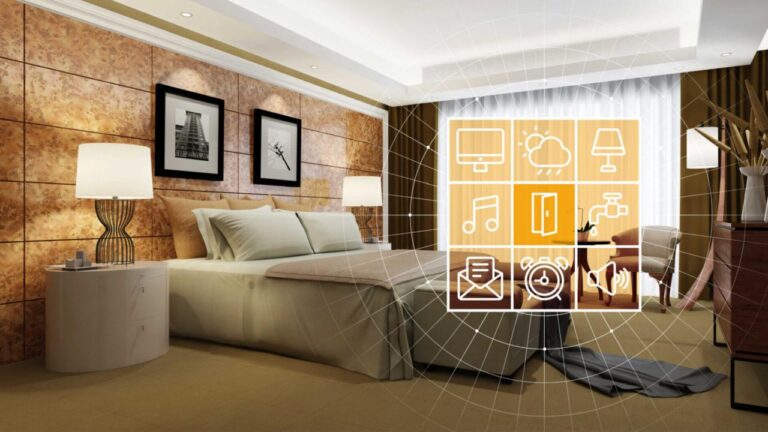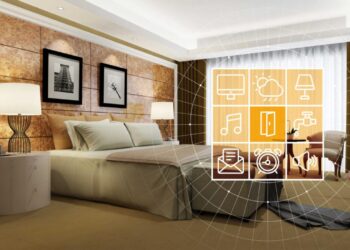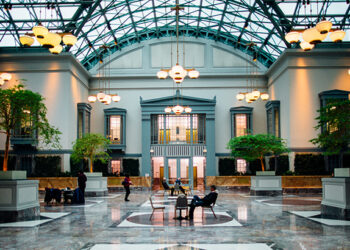The hospitality industry is undergoing a profound transformation, driven by an accelerating wave of technological innovation. Hotel tech, once a supplementary feature, has now become the central nervous system of modern accommodation, redefining guest experiences, streamlining operations, and unlocking unprecedented levels of efficiency and personalization. From the moment a traveler considers a booking to their final departure, technology is interwoven into every touchpoint, promising a future where stays are smarter, smoother, and more intuitive than ever before. This extensive article will explore the pivotal role of hotel technology, its current applications, its profound impact on the guest journey and operational efficiency, and the exciting trajectory of its future evolution.
The Digital Revolution
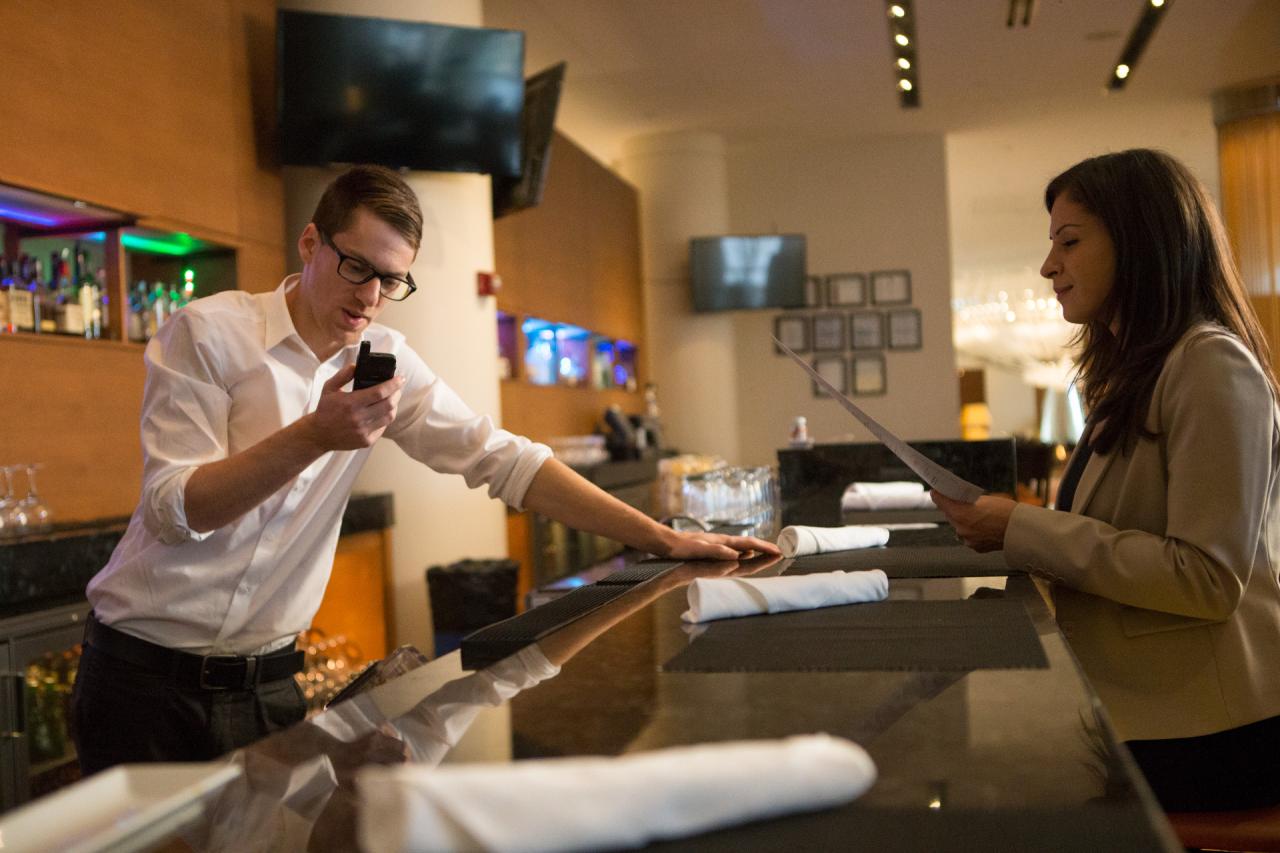
Technology has fundamentally altered how guests interact with hotels, empowering them with control, personalization, and seamless experiences from discovery to departure.
A. Pre-Arrival
The guest journey now begins long before physical arrival, largely facilitated by sophisticated hotel tech.
A. Online Travel Agencies (OTAs) and Metasearch Engines: Platforms like Booking.com, Expedia, and Google Hotels leverage advanced algorithms to aggregate vast numbers of hotel listings, offering travelers a wide array of choices, transparent pricing, and comprehensive reviews. This allows for easy comparison and informed decision-making.
B. Hotel Websites with Direct Booking Engines: Hotels invest heavily in user-friendly, responsive websites powered by robust booking engines. These often include virtual tours, detailed room descriptions, and enticing photo galleries, encouraging direct bookings which are more profitable for the hotel. Many offer loyalty program benefits only available through direct channels.
C. Personalized Marketing and AI Chatbots: AI-driven tools analyze traveler preferences and Browse history to deliver personalized offers and recommendations. Chatbots on hotel websites and social media provide instant answers to queries, guiding potential guests through the booking process 24/7, reducing friction and improving conversion rates.
D. Mobile Apps for Pre-Stay Communication: Many hotel chains offer dedicated mobile apps that allow guests to manage their bookings, check in remotely, select room preferences, and even pre-order amenities, building anticipation and reducing check-in times.
B. Arrival
The traditional front desk check-in is becoming increasingly digital, offering speed and convenience.
A. Mobile and Kiosk Check-in: Guests can bypass the front desk entirely by checking in via a hotel’s mobile app or self-service kiosks in the lobby. This not only saves time but also appeals to guests who prefer minimal human interaction.
B. Digital Room Keys: Smartphones are rapidly replacing traditional key cards. Digital room keys, securely stored in a hotel’s app, allow guests to unlock their doors with a tap or a wave, enhancing security and convenience. This also reduces plastic waste from disposable key cards.
C. Biometric Recognition: While still emerging, some high-end properties are exploring biometric solutions like facial recognition or fingerprint scans for seamless check-in and access to various hotel facilities, offering unparalleled speed and security.
D. Automated Baggage Handling: In larger resorts or airports integrated with hotels, automated baggage handling systems ensure luggage is safely transported to rooms without manual intervention, a seamless start to the stay.
C. In-Stay
Once in their rooms, guests benefit from a suite of technologies designed for ultimate comfort and control.
A. Smart Room Controls: In-room tablets or voice-activated assistants (like Alexa or Google Assistant) allow guests to control lighting, temperature, curtains, and entertainment systems with ease. This offers a personalized environment tailored to their preferences.
B. Streaming and Connectivity: High-speed Wi-Fi is now a basic expectation. Hotels also provide smart TVs that allow guests to stream their own content from services like Netflix or Hulu, replicating the comfort of home entertainment.
C. Digital Concierge Services: In-room tablets or mobile apps serve as digital concierges, enabling guests to order room service, book spa treatments, request housekeeping, or access local recommendations without needing to call the front desk.
D. Robotics for Service Delivery: Robots are increasingly deployed for tasks like delivering amenities (towels, toiletries), room service, or even providing security patrols. This frees up human staff for more complex, personal interactions.
E. Wearable Tech Integration: Some hotels are experimenting with wearable tech that allows guests to make payments, access facilities, or personalize their environment simply by wearing a wristband or smart watch.
D. Departure
Even the end of a stay is made smoother and more efficient through technology.
A. Mobile Checkout and E-receipts: Guests can review their bill and check out directly from their mobile devices, with e-receipts sent instantly to their email. This eliminates queues and provides immediate financial transparency.
B. Automated Feedback Systems: Post-stay surveys are often automated and delivered via email or app notifications, allowing hotels to gather valuable feedback efficiently. AI can analyze these responses to identify trends and areas for improvement, directly impacting future guest experiences.
C. Personalized Future Offers: Based on guest data and feedback, hotels can send highly personalized offers for future stays, encouraging loyalty and repeat bookings, further strengthening the relationship with the guest.
Operational Efficiency
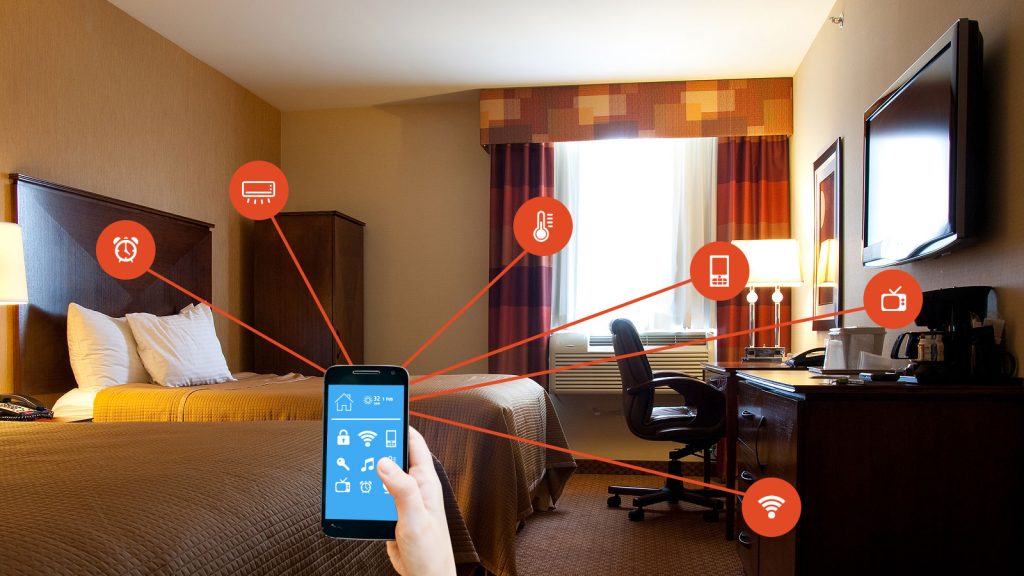
Beyond the guest experience, hotel technology is crucial for optimizing internal operations, leading to significant cost savings, improved staff productivity, and better overall management.
A. Property Management Systems (PMS)
The Property Management System (PMS) is the central nervous system of any hotel. It manages reservations, check-ins/check-outs, room assignments, billing, and guest profiles. Modern cloud-based PMS solutions offer real-time data, integrate with other hotel systems, and allow for remote management, enhancing efficiency and reducing errors.
B. Revenue Management Systems (RMS)
Revenue Management Systems (RMS) use sophisticated algorithms and big data analytics to dynamically price rooms based on demand, seasonality, competitor pricing, and market conditions. This ensures hotels maximize their revenue and occupancy rates, often operating with razor-thin margins. AI-driven RMS can predict demand with astonishing accuracy.
C. Housekeeping and Maintenance Management
Dedicated housekeeping and maintenance management software streamlines daily operations. It allows for efficient room assignment, tracking cleaning progress, flagging maintenance issues in real-time, and deploying staff more effectively. This ensures rooms are ready faster, and issues are resolved proactively, improving guest satisfaction.
D. Customer Relationship Management (CRM)
Customer Relationship Management (CRM) systems collect and manage vast amounts of guest data, including preferences, past stays, and feedback. This data is invaluable for personalized marketing, anticipating guest needs, and building strong, lasting relationships, fostering loyalty and repeat business. It’s the engine for true personalization.
E. Workforce Management and Communication Tools
Digital workforce management tools optimize staff scheduling, track attendance, and facilitate internal communication. Mobile apps allow staff to receive assignments, report issues, and communicate instantly, improving coordination and responsiveness across departments. This ensures a seamless flow of operations.
F. Food and Beverage (F&B) Management Systems
From inventory control and recipe management to point-of-sale (POS) systems and kitchen display systems (KDS), F&B management tech streamlines restaurant and bar operations. It helps reduce waste, manage costs, track sales, and improve order accuracy and speed, enhancing the dining experience.
G. Energy Management Systems (EMS)
Advanced Energy Management Systems (EMS) monitor and control a hotel’s energy consumption in real-time, optimizing HVAC systems, lighting, and other utilities based on occupancy, weather, and scheduling. This leads to significant energy savings and a reduced environmental footprint, contributing to sustainability goals.
The Economic and Societal Impact of Hotel Tech
The pervasive integration of technology in hotels has far-reaching economic and societal implications, shaping employment, consumer expectations, and the industry’s future trajectory.
A. Increased Revenue and Profitability
By optimizing pricing, streamlining operations, and enhancing the guest experience, hotel tech directly contributes to increased revenue and profitability. Hotels can capture more bookings, achieve higher occupancy rates, reduce operational costs, and encourage higher spending through personalized upsells.
B. Data-Driven Decision Making
The sheer volume of data collected by various hotel tech systems allows for unparalleled data-driven decision making. Hoteliers can identify trends, forecast demand, understand guest behavior, and make strategic adjustments to their services, marketing, and operations, leading to more informed and effective business strategies.
C. New Job Roles and Skill Requirements
While some fear job displacement, hotel tech is actually creating new job roles in areas like data analytics, cybersecurity, IT support, and specialized tech maintenance. It also demands new skills from existing staff, shifting roles from routine tasks to more strategic and guest-centric interactions, requiring ongoing training and upskilling.
D. Enhanced Guest Satisfaction and Loyalty
A seamless, personalized, and convenient experience fostered by hotel tech leads to significantly enhanced guest satisfaction. Satisfied guests are more likely to return, recommend the hotel to others, and become loyal brand advocates, leading to higher repeat business and positive online reviews.
E. Driving Industry Innovation and Competition
The rapid pace of innovation in hotel tech fuels intense industry competition. Hotels must continuously invest in and adapt new technologies to stay relevant and competitive, driving a cycle of improvement and pushing the entire hospitality sector forward in terms of service quality and efficiency.
The Future of Hotel Tech
The horizon of hotel tech is brimming with groundbreaking innovations that promise to redefine the very essence of hospitality.
- Hyper-Personalization via AI and Machine Learning: The future will see AI and machine learning not just recommending services but anticipating guest needs before they even arise, creating a truly bespoke experience from personalized room settings to tailored local recommendations. Imagine a room that automatically adjusts to your preferred temperature and lighting as you approach, based on your historical data and even real-time mood analysis.
- Virtual and Augmented Reality (VR/AR) Experiences: VR will offer hyper-realistic hotel tours and destination previews, allowing guests to “experience” their stay before booking. AR will enhance on-site experiences, providing interactive maps, virtual concierges, and contextual information about hotel facilities or local attractions directly through a guest’s smartphone or smart glasses.
- IoT and Connected Rooms: The Internet of Things (IoT) will create fully integrated “smart rooms” where every device—lights, climate control, entertainment, even the mini-bar—is connected and communicates, offering seamless control and intelligent automation. This will extend to predictive maintenance, where sensors detect potential issues before they become problems.
- Biometric Identity and Access: Beyond digital keys, biometric solutions (facial recognition, fingerprint scans, retina scans) will become standard for secure and seamless check-in, room access, payment, and access to hotel facilities like gyms or pools, eliminating the need for cards or even phones.
- Predictive Analytics for Operations: Hotels will leverage even more sophisticated predictive analytics to optimize staffing levels, anticipate maintenance needs, forecast inventory requirements, and personalize marketing campaigns with unprecedented accuracy, leading to even greater operational efficiency and cost savings.
- Robotics and Automation Expansion: Robots will take on more complex roles beyond simple deliveries, including cleaning and sanitization (especially post-pandemic), basic food preparation, and more advanced concierge tasks, freeing human staff for high-touch interactions and problem-solving.
- Blockchain for Security and Loyalty: Blockchain technology could be used to secure guest data and transactions, ensuring privacy and preventing fraud. It might also power more transparent and interoperable loyalty programs, allowing guests to earn and redeem points across a wider ecosystem of travel providers.
- Sustainable Tech Solutions: Energy management systems will become even smarter, integrating with local grids and renewable energy sources. Water recycling and waste management systems will be fully automated and optimized, pushing hotels towards truly net-zero or even regenerative environmental footprints.
- Hyper-Localized Digital Guides: AI-powered digital guides will offer real-time, hyper-localized recommendations based on a guest’s specific interests, current location within the city, weather conditions, and real-time events, making every trip feel uniquely curated.
- Voice Commerce and Natural Language Processing (NLP): Booking and in-stay requests will increasingly be handled through natural language conversations with AI assistants, making the process feel effortless and intuitive.
Conclusion
Hotel tech isn’t merely an enhancement; it is the very engine driving the hospitality industry into a new era. It’s about creating intelligent, intuitive, and highly personalized environments that cater to the evolving needs and expectations of the modern traveler. As these innovations continue to mature, the distinction between the physical and digital aspects of a hotel stay will blur, resulting in experiences that are not only seamless and efficient but also deeply memorable and uniquely tailored to each guest. The future of travel is undeniably technological, and hotels are at the forefront of this exciting revolution.

